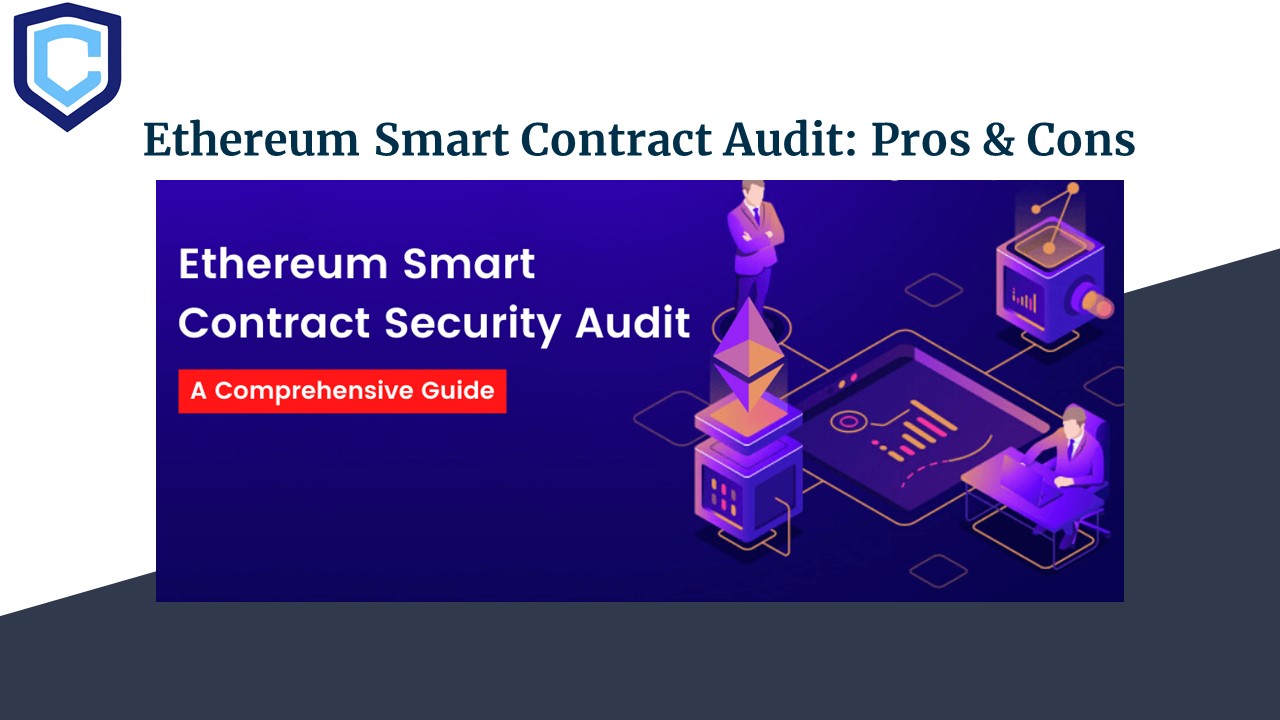Ethereum Smart Contract Audit: Pros & Cons - PowerPoint PPT Presentation
Title:
Ethereum Smart Contract Audit: Pros & Cons
Description:
Being popular has its consequences, and second-placed cryptocurrency Ethereum is clearly a target for online crooks. – PowerPoint PPT presentation
Number of Views:3
Title: Ethereum Smart Contract Audit: Pros & Cons
1
Ethereum Smart Contract Audit Pros Cons
2
Ethereum Smart Contract Audit Pros Cons
Ethereum Smart Contract Before going on to the
auditing industry, let's first obtain a
fundamental grasp of what an Ethereum smart
contract is and its multiple use cases. What is
an Ethereum Smart Contract? The simplest
definition of an Ethereum smart contract is a
group of computer code that executes on the
Ethereum blockchain and is kept at a specific
address. Similar to how Ethereum accounts
function, smart contracts have a balance and the
capacity to send transactions via the network.
They are overseen by no specific person. Instead,
they are set up on the network and run like
software. User accounts can then connect with a
smart contract by submitting transactions that
execute a certain function.
3
Pros of Ethereum Smart Contract Auditing
Being popular has its consequences, and
second-placed cryptocurrency Ethereum is clearly
a target for internet criminals. The history of
Bitcoin and Blockchain attacks and scams
demonstrates that deploying unaudited code on the
blockchain is the single greatest mistake that
has ever been committed. It is hard to grasp the
scale of the harm caused by even the tiniest
vulnerability in your smart contract. The
following list includes a few more advantages of
publishing an audited smart contract to the
Ethereum Mainnet. Avoid Costly
Mishaps Blockchain is a type of distributed
ledger that cannot be changed. After deployment,
you are unable to make changes to your code. As a
result, it is vital to guarantee that your smart
contract has been thoroughly examined for flaws.
4
Expert Analysis
Even though the audit process may be automated,
manual, or a hybrid of the two, it nevertheless
delivers a professional viewpoint on your code.
Manual auditing entails meticulously reading
through smart contracts line by line to detect
any flaws. Continuous Validation Audit
companies frequently provide re-audits after
post-code updating. It recommends that
programmers update the code to address problems
and enhance it in accordance with the
recommendations offered by the Ethereum smart
contract auditors after an audit. After making
the required improvements, auditors will examine
the code to determine if it operates as
anticipated. Analytics Reports in
Depth Essentially, a comprehensive auditing
report highlights the smart contract flaws and
categorises them by severity. The developer can
boost performance by making crucial changes
thanks to an analytics report.
5
Cons of Ethereum Smart Contract Audit
There is always a bad side to everything, and
auditing is no different. We are not attempting
to dissuade you from having your contracts
evaluated in any way by highlighting the
shortcomings of auditing. Several disadvantages
of auditing Ethereum smart contracts are listed
below. Auditing is an expensive endeavour. The
thousands of dollars that auditing might
occasionally set you back just adds to the
exchequer's burden. Due to the Ethereum security
audit, implementing smart contracts is frequently
an expensive process. Necessitates trusting a
third party One must give the auditors all
necessary information to guarantee a smooth
auditing process. It includes technological
specifications, business requirements, and more.
This calls for building a reliable relationship
with your auditors, which may have unforeseen
consequences.
6
Cons of Ethereum Smart Contract Audit
An audit of a smart contract alone is
insufficient. Auditing has been popular for a
while. Even said, news reports about Ethereum
scams do periodically surface, suggesting that
auditing is probably not the sole security
mechanism a smart contract needs. It is suggested
to continue using strategies like bug
bounties. It takes time to complete an
audit. Even if simple contracts like
crypto-tokens can be finished in a few days,
complex smart contracts with extensive
tokenomics, such as DApp and DeFi, might take up
to a few weeks or months to complete. There may
be a delay in transactions as a result of this.
7
Conclusion
One of the main issues currently hindering the
adoption of smart contracts is security. Since
blockchain technology is immutable, it is not
possible to update the code after it has been
made available on the mainnet. Placing smart
contracts without doing enough audits might
result in unfavourable outcomes, such as
performance that deviates from what the contract
was intended to produce. Smart contract audits
ensure that your blockchain system is efficient
and secure. Smart contracts are being used by
more and more individuals, but blockchain
technology is complex. The need for ethereum
smart contract auditing is growing in importance
for the creation of secure blockchain assets.































